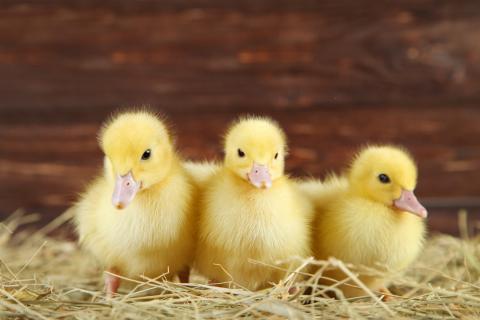
Adding chickens to a small homestead is a very common way to get started with self-sufficiency. They are easy to take care of, will do bug patrol, and turn your kitchen scraps into garden gold. On top of that, you get fresh eggs daily! So, why would you consider adding in ducks?
Ducks have so many wonderful benefits on the homestead. They are often better at foraging than chickens. Many ducks will also lay consistently throughout the year, no matter the weather or amount of light, whereas chickens need at least 12-14 hours of daylight to keep laying.
Ducks also have a fun personality that make them entertaining to watch. They are usually friendly creatures that you can let loose in the garden area in the evenings and they won't destroy it as they are eating bugs, slugs, and other pests.
Now that you have decided that you want to get started with ducks, what’s next? Well, there are two ways you can start out with ducklings. One: you can purchase hatching eggs and hatch them out yourself. That will take a few weeks, but is always fun. Or if you don't like to wait, you can purchase live ducklings at your local farm supply store. They are most often available just before Spring and the Easter holiday. Most of the time, you will be required to have at least 2-4 in your purchase and you won't be able to tell if it's a male (drake) or female (duck).
I recommend that you buy 2 more than you want to keep in case you have more drakes or one dies. As far as noise considerations, the drakes are considerably less noisy than the ducks are. A group of ducks will “quack, quack, quack” as they are chatting. It can get noisy at times, but they don't do it all day. Think of it as a welcoming committee in your backyard.
What You Need To Raise Ducks
When you are ready to add ducks, you will need a few things for them.
You will need a brooder box for them, which must be predator-proof and provide plenty of fresh air. You can use the same one you would with chicks, but be sure to clean it well first. After the first couple of days, ducklings need more space than chicks, so it’s important the brooder provides at least 6-10 square inches per duckling the first week, and that it can give them at least 12-15 square inches each after.
Ducklings also need heat for the first few weeks of life. Use a heat lamp to provide about 98-degree Fahrenheit temperatures for the first week, and then take it down 5 degrees each week as they grow. You can tell if they are getting too hot if they are panting and lying still, and if they are too cold they will be huddled together.
Of course, you will need feed for your ducklings. You can feed them the chick starter as we have always done, but some say that they do best on duck starter. If you choose to feed them regular chick starter, be sure to get the non-medicated kind. Some feeds add medication to prevent coccidiosis and ducklings can overdose on that and die. Ducks do need more niacin in their diets, and what you can do to supplement is to add a couple tablespoons of brewer's yeast to their food.
When they are still covered with down, they will need water, but you don't want to put them into a pool yet. A regular chick waterer will do just fine. Ducklings in the wild have their mothers to add an oil to their down to keep them afloat in the water, but in a domestic situation, they don't have that added oil. Their down can get soaked and they can actually drown. We put an old pie pan in our tub and let them play in that for an hour or so every couple of days to keep them happy. It's not necessary, but it's fun.
Once they are feathered out, you will need a pool or other body of water, such as a pond. They are waterfowl, and will be happiest if they are in the water. However, you can just add a bucket of water for them, as long as they can dip their bills. They need the water to help them eat their food. The pool or bucket will get nasty and muddy and will need to be rinsed out at least every other day, so you want one that you can handle. Large plastic kiddie pools can be heavy when filled and hard to drain, so you will want to use the smaller plastic pools.
Ducks generally start laying eggs around 7 months of age, and the eggs are very tasty…If you can find them. Ducks do not go into nesting boxes to lay, but will generally lay where ever they feel safest. If you put them to bed each night in a coop or duckhouse, they will probably lay there. Ours are “free range” and sleep in their pools at night in the summer, so their eggs are by their pool. It's a fun egg hunt daily! You will get to know where they lay most often pretty quick, however, and be able to enjoy them. They are often one-and-a-half or two times the size of chicken eggs and are perfect for baking and cooking! Their rich taste is amazing!
Are you considering adding ducks to your homestead? What are some things you look forward to when you add ducks?








